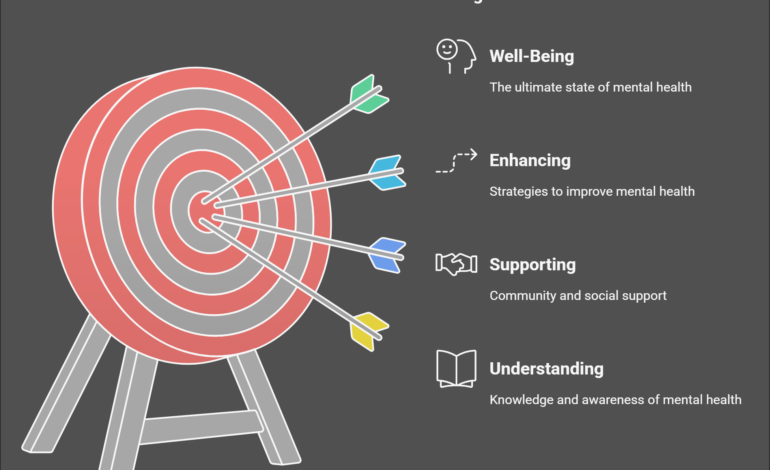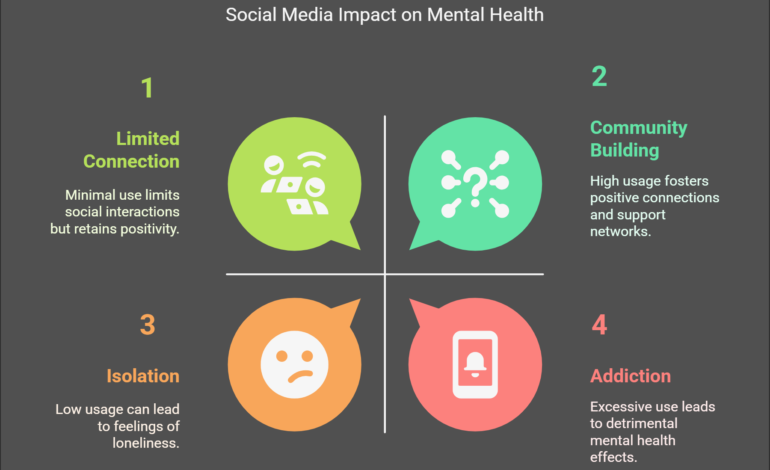Mental Health Matters: Understanding, Supporting, and Enhancing Well-Being

In our fast-paced and often demanding world, mental health has become a crucial component of overall well-being. It influences how we think, feel, and act, affecting our relationships, work, and daily functioning. Mental health matters, and recognizing its importance is essential for leading a fulfilling life.
What is Mental Health?
Mental health encompasses our emotional, psychological, and social well-being. It affects how we handle stress, relate to others, and make decisions. Good mental health is more than just the absence of mental illness; it’s about thriving and coping effectively with life’s challenges. MedlinePlus
The Importance of Mental Health
1. Impact on Physical Health
Mental health and physical health are intricately linked. Conditions like depression and anxiety can lead to physical symptoms such as fatigue, sleep disturbances, and aches. Conversely, chronic physical illnesses can contribute to mental health issues, creating a cycle that affects overall well-being. news+3Cleveland Clinic+3CDC+3CDC

2. Influence on Daily Life
Mental health significantly impacts our daily activities. It affects our ability to work, study, and engage in social interactions. Good mental health enables us to cope with stress, maintain relationships, and make decisions, contributing to a higher quality of life.
3. Economic and Social Implications
Poor mental health can lead to absenteeism from work or school, reduced productivity, and strained relationships. Addressing mental health issues benefits not only the individual but also society by fostering a more engaged and productive community.MedlinePlus+1MarketWatch+1
Prevalence of Mental Health Issues
Mental health issues are more common than many realize. In the United States, approximately 22.8% of adults experienced mental illness in 2021, equating to about 57.8 million people. Globally, it’s estimated that 970 million people live with a mental disorder, with anxiety and depression being the most prevalent. WikipediaNAMIWikipedia+2World Health Organization (WHO)+2World Health Organization (WHO)+2
Common Mental Health Disorders
- Anxiety Disorders: Characterized by excessive worry, fear, or nervousness.
- Depressive Disorders: Involving persistent feelings of sadness and loss of interest.
- Bipolar Disorder: Marked by extreme mood swings between high and low.heraldsun+5You’re Ready for Your Degree+5National Institute of Mental Health+5
- Schizophrenia: Affects thinking, feeling, and behavior, leading to distorted perceptions.
- Eating Disorders: Involve preoccupation with food, weight, and body image.
Recognizing the Signs
Identifying mental health issues early can lead to timely intervention. Signs may include:Wikipedia+15National Institute of Mental Health+15You’re Ready for Your Degree+15
- Persistent feelings of sadness or hopelessness.
- Extreme mood swings.
- Withdrawal from friends, family, and usual activities.
- Significant changes in eating or sleeping patterns.
- Difficulty performing daily tasks.Midland Daily News+22You’re Ready for Your Degree+22Mental Health America+22
Supporting Mental Health
1. Open Communication
Discussing mental health openly helps reduce stigma and encourages those struggling to seek help. Creating a supportive environment involves active listening and empathy.
2. Professional Help
Mental health professionals, such as psychologists, psychiatrists, and counselors, are trained to provide therapy and, if necessary, medication to manage mental health conditions. Seeking professional help is a sign of strength and a vital step toward recovery.
3. Self-Care Practices
Engaging in self-care activities can improve mental well-being:
- Regular Exercise: Physical activity releases endorphins, improving mood.
- Healthy Diet: A balanced diet supports overall health, including mental health.
- Adequate Sleep: Quality sleep is essential for emotional regulation.
- Mindfulness and Meditation: These practices can reduce stress and promote calmness.
4. Building Social Connections
Maintaining relationships with friends and family provides emotional support and a sense of belonging. Participating in community activities can also foster connections and enhance well-being.
Addressing Mental Health Matters in Different Populations
Children and Adolescents
Mental health is crucial at every stage of life, including childhood and adolescence. Early intervention can prevent long-term issues. Approximately 16.5% of U.S. youth aged 6-17 experienced a mental health disorder in 2016. MedlinePlusNAMI
College Students
The transition to college can be challenging, with many students facing mental health issues. It’s essential for educational institutions to provide resources and support systems. In 2019, the National College Health Assessment noted that 20.2% of students experienced depression, and 27.8% experienced anxiety affecting their studies. You’re Ready for Your Degree
Older Adults
Mental health in older adults is often overlooked. Factors like isolation, chronic illness, and loss can affect well-being. Mental health matters, and addressing these issues involves community support and accessible services.
Strategies for Enhancing Mental Health
- Education and Awareness: Understanding mental health promotes empathy and reduces stigma.
- Accessible Services: Ensuring mental health services are available and affordable is vital.
- Community Support: Building supportive communities fosters a sense of belonging and security.
- Policy Initiatives: Advocating for policies that prioritize mental health can lead to systemic improvements.








3 Comments
[…] Professional Help if Needed: If social media use is significantly impacting mental health, consider speaking with a mental health […]
[…] dealing with mental health challenges like anxiety, depression, or stress, it can feel isolating and overwhelming. A quote […]
[…] In today’s world, social media has become a significant part of everyday life. With the rise of platforms like Instagram, Facebook, Twitter, TikTok, and others, it’s never been easier to connect with people around the globe. We can share our experiences, interact with friends, and discover new information. However, as we embrace the digital world, it’s important to understand its implications on our mental health—specifically when it comes to depression. The constant exposure to curated content on social media can lead to negative self-comparisons, social isolation, and a distorted sense of reality, which may contribute to the development or worsening of depression. Social media’s influence on depression highlights the need for awareness and responsible usage to maintain emotional well-being. For more insights on mental health and its connection to social media, you can visit Mental Health Matters. […]